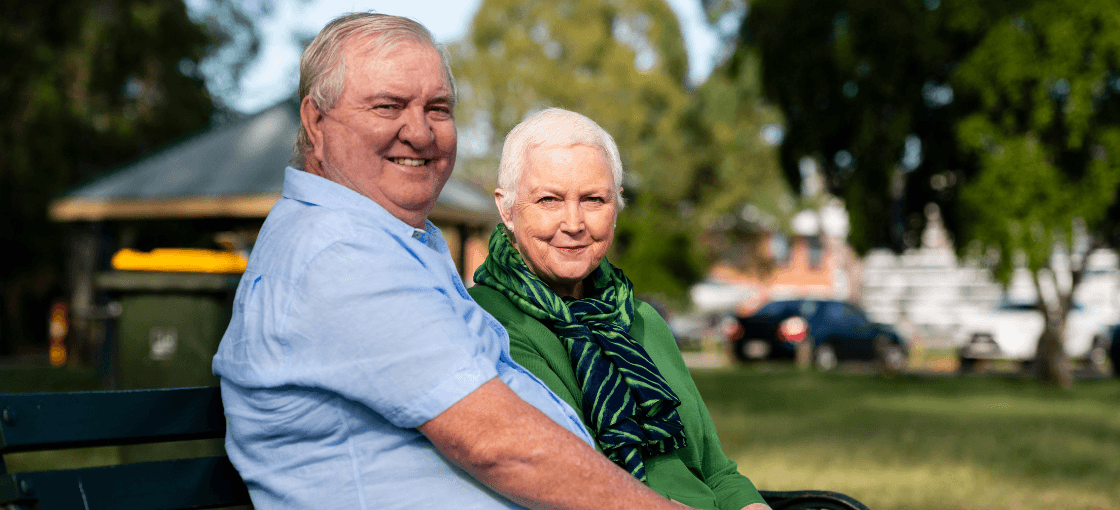Maureen’s unexpected journey with ovarian cancer

It’s the cancer that’s often called the ‘silent disease’; one that you hope you discover early before it’s too late.
After working as a teacher librarian for more than twenty years, Mum of three Maureen was planning a trip to Uluru with her husband Kevin to celebrate her retirement, when she was unexpectedly diagnosed with stage three ovarian cancer.
Just a week after she finished work, Maureen had the feeling that something wasn’t quite right.
“We had just spent the weekend at Noosa with friends, eating and enjoying ourselves. When we got home I thought to myself ‘I’m getting a bit fat—I’ll have to watch what I eat,’” Maureen says.
“But a week later, after being very strict with my diet, I’d put on another three kilos and I felt really bloated.”
Breaking the news
Maureen went to see her GP, who sent her for a scan right away.
“My doctor told me they’d found a lump and that it was most likely ovarian cancer, but we needed a biopsy to confirm it,” Maureen said.
“I was just so shocked. It didn’t feel real—I felt quite well and I have no other health problems. The only symptom I had was bloating.”
Maureen was referred to Mater’s Director of Gynaecological Oncology Associate Professor Lewis Perrin. Professor Lewis Perrin performed a laparoscopy and discovered she had stage three ovarian cancer.
“Dr Perrin was wonderful. He said to me ‘this is serious, but this is not hopeless. We are going to get you well, we’ve got a plan and we’re going to get your health back on track,” Maureen said.
Dr Perrin created a detailed treatment plan for Maureen of the procedures, treatments and therapies she would need to undergo over the next six months.
“When Dr Perrin told me his plan for my treatment, I felt like I had an anchor to hold onto,” Maureen says.
“I was no longer floating at sea, wondering what was happening—I had a plan and I remember thinking ‘great; this plan is my anchor’. That plan made me feel like I could move forward with my life.”
Maureen started chemotherapy right away and underwent an extensive operation including a full hysterectomy. The complex surgery took eight and a half hours, involving Dr Perrin and the Peritonectomy team at Mater including Dr Naidu, Dr Chetty and Dr Jagasia. They removed tumors from multiple sites including underneath Maureen’s diaphragm and more than 20 centimeters of her bowel.
Maureen says it was the support of her husband and the medical staff at Mater that helped her through this very difficult time.
“Dr Perrin was always upbeat and so attentive,” she says.
“Every time I saw him he would smile at me and say ‘How are you today? Looking good! Excellent results! Your treatment is on track’. At each appointment he would be so confident, which made me confident.”
On the road to recovery
“At my recent follow up appointment he smiled at me and said ‘well now you can book that trip to Uluru! So we did, and we’re travelling there in July.”
Maureen says that if it weren’t for the prompt action of her GP and Dr Perrin, she might not be here today.
“I’m lucky that my doctors got onto it so fast. But like most women with ovarian cancer, my tumour wasn’t discovered until quite advanced. There is no early detection test.”
Fortunately, Mater researcher Professor John Hooper and his team are working hard to change this reality. Professor Hooper is working to create a new test for ovarian cancer, which would significantly improve the survival rates of women like Maureen.
Professor Hooper’s newly developed test has been shown to detect very small volumes of ovarian cancer cells with high levels of accuracy. The test is currently undergoing pre-clinical trials and has received very promising results, and they have plans to test it in patients in the next three years.
“As women, we all appreciate that we can have a mammogram and receive an early diagnosis for breast cancer, or a pap smear to check for early stage cervical cancer. However, there’s nothing like that for ovarian cancer, so often it’s found when it’s almost too late,” Maureen says.
“Imagine if you could be diagnosed early, rather than finding out that you have full-blown, advanced cancer—it would be life-changing.”
“It will happen one day, we’d just like it sooner rather than later. The only way we’re going to get there is through continued investment in medical research.”
By supporting Mater Cars for Cancer lottery you are helping to drive vital medical research like Professor Hooper’s. This can mean the difference between life and death for future ovarian cancer patients. You can help to change the lives of women like Maureen by purchasing your tickets today.
